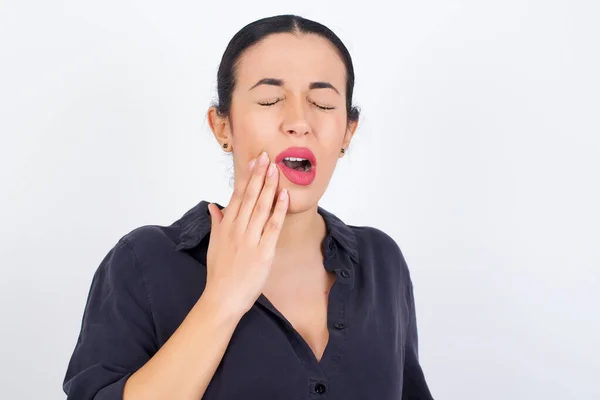Experiencing pain in the roof of your mouth can be uncomfortable and concerning. “Why Does the Roof of Your Mouth Hurt?” Understanding the potential causes and remedies can help you manage this discomfort effectively. Keep reading to learn what can trigger pain in the roof of the mouth, how to treat it, and when it might signal something more serious.

What Causes the Roof of Your Mouth to Hurt?
Pain in the roof of your mouth, also known as the palate, can arise from various factors. Here are some common causes:
Trauma and Burns
- Hot Foods and Beverages: Consuming excessively hot foods or drinks can burn the sensitive tissue in your mouth, leading to pain and swelling.
- Sharp Foods: Eating sharp or abrasive foods can cause cuts or irritations on the palate.
Infections
- Viral Infections: Conditions such as cold sores (caused by the herpes simplex virus) can lead to painful lesions on the roof of your mouth.
- Bacterial Infections: Infections like strep throat or sinusitis can cause referred pain to the palate due to inflammation and pressure in nearby areas.
- Fungal Infections: Oral thrush, a yeast infection caused by Candida albicans, may result in soreness and discomfort in the mouth.
Mouth Sores
- Canker Sores: These small, painful ulcers can develop on the roof of your mouth, often triggered by stress, certain foods, or vitamin deficiencies.
- Cold Sores: Unlike canker sores, cold sores are caused by a viral infection and typically appear on or around the lips but can affect the palate as well.
Underlying Health Conditions
- Gingivitis: Inflammation of the gums due to plaque buildup can lead to discomfort that radiates to the roof of your mouth.
- Burning Mouth Syndrome: This condition is characterized by a burning sensation in the mouth, including the palate. It is more common in post-menopausal women and may be linked to hormonal changes or nutritional deficiencies.
- Autoimmune Diseases: Conditions like lupus or Sjögren’s syndrome can lead to oral symptoms, including pain in the roof of your mouth due to dryness and inflammation.
- Electrolyte Imbalance: Low levels of essential minerals may cause swelling and tenderness in various tissues, including those in the mouth.
Home Remedies for Pain in the Roof of Your Mouth
Fortunately, several home remedies may help alleviate discomfort associated with pain in the roof of your mouth:
Salt Water Rinse
Mix one teaspoon of salt in half a cup of warm water. Swish this solution around your mouth for 15–30 seconds before spitting it out. This rinse can help reduce inflammation and promote healing by drawing out excess fluid from swollen tissues.
Clove Oil
Clove oil has natural analgesic properties. Applying a small amount directly to painful areas may provide relief from discomfort. Always dilute it with carrier oil if necessary.
Aloe Vera
Applying aloe vera gel directly to painful areas can soothe irritation and promote healing thanks to its anti-inflammatory properties. Drinking aloe vera juice may also help reduce inflammation internally.
Honey
Known for its antimicrobial properties, honey can be applied directly to sores for relief. Its natural healing qualities may speed up recovery while preventing further infection.
Coconut Oil
Swishing coconut oil in your mouth (a practice known as oil pulling) may help reduce bacteria and soothe irritation. Its anti-inflammatory properties make it an excellent choice for oral health.
Yogurt
Probiotic-rich yogurt can help restore balance in your oral microbiome. Consuming yogurt regularly may reduce occurrences of canker sores and promote overall oral health.
Cold Compress
Applying a cold compress on the outside of your mouth near the painful area may help numb discomfort and reduce swelling temporarily.
Watch: What is Causing My Burning Mouth Syndrome? | This Morning
Conclusion
Pain in the roof of your mouth can stem from various causes ranging from minor irritations to more serious health conditions. While home remedies often provide relief, persistent symptoms should prompt a visit to a healthcare professional for proper diagnosis and treatment. By understanding potential causes and employing effective home remedies, you can manage discomfort more effectively and maintain better oral health.
Also Read | How Jane Hajduk and Shari Doran Made Menopause Hilarious on YouTube
Content source – www.soundhealthandlastingwealth.com

